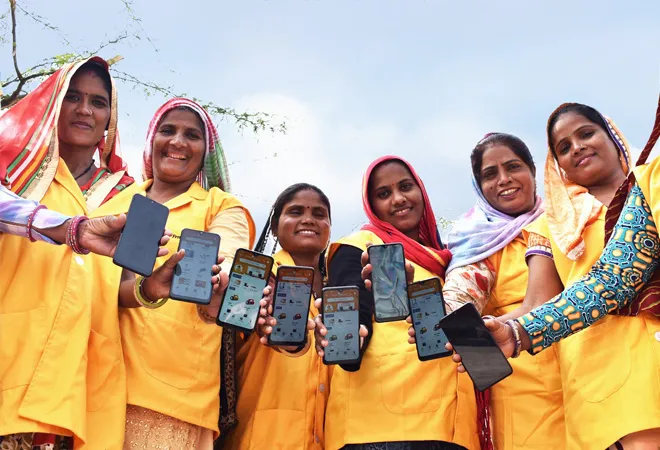-
CENTRES
Progammes & Centres
Location
Social commerce can become a powerful tool for promoting women's economic empowerment

Social media adoption and consumption have witnessed exponential growth in recent times, invariably provoking engagement across generations. This has been accompanied by a rise in social commerce, wherein producers and consumers can use social media to promote and directly engage with each other for business transactions. As of 2021, the estimated size of the global social commerce market was US$492 billion, with an expected 2.5X growth by 2025. This rapid rise in social commerce is expected to outpace the development of traditional marketplaces by almost three times, led by a more inclusive model of private sector participation in global economic growth. In this space, gender dynamics will play a critical role.
Generating a smooth avenue for the transition from farm to non-farm employment has helped women build their businesses, add to their household incomes, and improve their economic and social well-being.
These non-traditional marketplaces on social media are playing a significant role in women's economic empowerment, contributing to the prospects of resilient growth. Social commerce platforms allow women to connect with buyers and sellers outside the traditional marketplaces. It also allows them sell their products and services online at lower transaction costs. Generating a smooth avenue for the transition from farm to non-farm employment has helped women build their businesses, add to their household incomes, and improve their economic and social well-being.
Social commerce: A suitable alternative for women?
The crosscurrents for a global economic downturn have been gaining strength for some years now. However, the onset of the COVID-19 pandemic, the ensuing economic fallout, and the continuing Ukraine-Russia conflict—which have caused global supply chain disruptions, food shortages, and energy price hikes—have had a devastating impact on the global economy. Dealing a severe blow to growth prospects and livelihoods across countries, the pandemic caused 114 million job losses over 2020-21, leading to a net US$ 3.7 trillion decline in labour income.
Moreover, these labour market disruptions were marked by significant gender disparities—compared to a 3 percent decline for men, employment rates for women fell by 4.2 percent between 2019 and 2020. As the world made an uneven recovery, labour market trends witnessed a promising rebound, with the additional gender gap in weekly hours declining to 1.5 percentage points, which is lower than pre-pandemic levels. The global economy was already exhibiting encouraging signs of a declining gender gap in labour force participation and employment rates. The COVID-19 pandemic fast-tracked the global transition to a ‘digital first’ economy, further adding to these prospects.
The global economy was already exhibiting encouraging signs of a declining gender gap in labour force participation and employment rates.
In the post-pandemic era, social commerce is playing a vital role for women entrepreneurs, helping them recover from the impacts of the pandemic and build a better future for themselves and their families. In addition to formal engagement with e-commerce giants such as Amazon and Flipkart, women-run small businesses have been successfully using marketplaces on social media platforms like Facebook, Instagram, and WhatsApp to communicate with their clients, as well as advertise and conduct their business online. Women entrepreneurs with access to social commerce platforms are more likely to earn higher incomes; have access to financial services at lower costs along with adequate credit for funding their business, incur lower operational costs, and overcome logistical barriers such as restricted mobility and transportation costs.
Social commerce can become a powerful tool for promoting women's economic empowerment for several allied reasons. To begin with, the expansion in the adoption of mobile phones and internet connection in large parts of the world has made social commerce a viable option for women residing in even the most remote areas with limited access to conventional markets. Secondly, no specialised skills or additional training are required to run a business on social media platforms. Moreover, social media marketplaces offer great time-use flexibility allowing women to strike a balance between their business management and domestic responsibilities. Most importantly, social commerce provides an opportunity for women entrepreneurs to connect more easily with their counterparts for networking and learning from each other's experiences. It also enables these small businesses' outreach to reach a global audience, opening up opportunities to explore new markets and expand sales significantly. Besides, even for women employed in salaried jobs, the flexibility of social commerce provides them with the chance of a sustainable secondary source of income and adds to their financial security.
The expansion in the adoption of mobile phones and internet connection in large parts of the world has made social commerce a viable option for women residing in even the most remote areas with limited access to conventional markets.
However, with the expansion of social commerce, the landscape is likely to become more competitive. Several steps will be necessary to ensure continued benefits for women-run small businesses accruing from the social commerce marketplaces. To successfully tap into the social commerce opportunity, women entrepreneurs must be mentored to identify the most suitable platforms to engage on based on their products or services, compartmentalise the different kinds of audiences they cater to across platforms, create a social media strategy that is well-suited for each demographic, and accelerate sales and outreach through personalised customer support and service. Some platforms can also engage with women entrepreneurs in these social commerce marketplaces for this specific purpose. Examples include the International Trade Centre's SheTrades Initiative and the WeConnect International network, which provide women with access to training, mentorship, and other resources that can help them start and grow their businesses.
Gender parity, economic growth, and social resilience
Women, accounting for nearly one-half of the global population, contribute only 37 percent to the global Gross Domestic Product (GDP). Women need to be provided with a platform that can offer self-employed women (and enable them to provide for other women) better and equitable economic opportunities to further growth and development. Advancing women's entrepreneurship can create this platform, leading to higher female labour force participation directly and indirectly, in the short and long term, respectively. Moreover, establishing a thriving ecosystem for female entrepreneurs can help other unemployed women overcome societal biases towards women-led ventures, effectively improving their social standing. Promoting women's economic empowerment and social commerce can lead to improvements in gender parity in workforce participation, create opportunities for economic growth, and add to the prospects of a resilient society.
Empowering women economically and ensuring their financial security can directly contribute to advancements in food security, child and maternal healthcare, and improved access to education for the next generation—augmenting the existing human capital base.
Gender parity in economic participation can positively affect economic growth and social development. Encouraging greater participation of women in the economy, it can introduce new participants in the labour market, which can increase competitiveness, boost productivity, and encourage investments in physical capital, ultimately resulting in income growth. Additionally, empowering women economically and ensuring their financial security can directly contribute to advancements in food security, child and maternal healthcare, and improved access to education for the next generation—augmenting the existing human capital base. Ultimately, advancing economic equity from a gendered perspective can ensure greater agency for women and contribute to their social mobility. Therefore, gender parity in economic participation can simultaneously build upon the social values of physical and human capital to promote efficiency and equity within economic systems as well as nurture social resilience against future shocks emanating from a global health emergency, any geopolitical turmoil, or the aggravating climate crisis.
Debosmita Sarkar is a Junior Fellow with the Centre for New Economic Diplomacy at Observer Research Foundation.
The views expressed above belong to the author(s). ORF research and analyses now available on Telegram! Click here to access our curated content — blogs, longforms and interviews.

Debosmita Sarkar is an Associate Fellow with the SDGs and Inclusive Growth programme at the Centre for New Economic Diplomacy at Observer Research Foundation, India. Her ...
Read More +